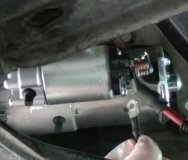Adjustable crankshaft position sensors will have a slotted mounting hole that allows it to be pushed in so far it can hit the flywheel / flex plate. That is typical on older Chrysler products where the sensor is in the bell housing of the transmission. Oem sensors come with a thick paper spacer stuck to the end to set the gap. That spacer slides off when the engine is started and is done doing its thing. You must visit the dealer for another spacer if you want to remove and reinstall that sensor.
Aftermarket sensors usually have a thin plastic rib molded into the end to set the gap. That rib wears away when the engine is running. To remove and reinstall that type, you are supposed to cut the remaining part of the rib off, then use the paper spacer.
While I am definitely not a transmission expert, I did replace about a dozen of them on Chrysler minivans while working at the dealership. At first I was cutting those spacers into quarters so I could save some for later. That way one spacer took care of four vehicles. Later I got cocky and stopped using them. I just shoved the sensor in all the way, then pulled it out about 1/16". I never had one break, but I did hear that two weeks after I did that on one van, the engine began stalling intermittently when warm. The Engine Computer memorized the diagnostic fault code for that sensor so someone else replaced it. They apparently never associated it with the recent transmission replacement. I suppose it's possible the sensor really did fail, but more than likely it was my fault for not following procedure.
The GMs I'm familiar with have their crankshaft position sensors down by the vibration damper and are not adjustable. As we speak, I have one of those dampers laying in my front yard that got destroyed by a former student. He was a very nice kid but a walking disaster. Somehow he managed to bend either the sensor or the tabs on the damper because both got shredded.
While spacing is not a concern on those, a cracked core is a possibility. In effect that makes two magnets side-by-side instead of one, and that moves the center of one of those magnets to a slightly advanced position. The typical symptom is back firing through the intake but that could also stress a starter. That is not real common but neither is four bad starters in a row. GM has had similar problems with magnetic pickup sensors in distributors too.
I don't remember hearing of cracked cores on Fords, or Chryslers either for that matter, but that doesn't mean that couldn't happen. What is much more common is the sensors failing when they get warm. With the two-wire magnetic coils, the wire breaks creating an open circuit, often when the engine is warm or after a hot soak, when the engine has been sitting for 10 - 30 minutes. With the three-wire sensors, a magnetically-controlled transistor is turned on and off rather than a pulse being developed in the magnetic coil-type. That transistor and its associated circuitry do not like heat so they are more prone to failure.
As a final thought on the subject, the air gap on the old Chrysler pickups in the distributors of '70s era cars was very critical. It was supposed to be.018". On one of my cars, I couldn't get the rotor off to replace it so I cracked it with a hammer and screwdriver. That bumped the pickup enough that it created a no-start condition. Found out the gap had increased to around.024". The thickness of two sheets of paper was enough to cause trouble.
Getting back to your vehicle, have you determined what is failing on these starters? If it is the drive gear and over-running clutch, I doubt there are that many that were defective in manufacture so I'd be looking for a cause involving the engine / ring gear. If the problem is electrical in nature, you might look closer at something the rebuilder is overlooking. Often the people doing the work are simply following instructions and don't understand what other things to look for.
Caradiodoc
SPONSORED LINKS
Friday, October 29th, 2010 AT 6:43 PM




